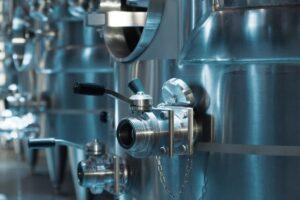
Latin America is in the midst of a water crisis, with nearly 80% of its wastewater left untreated. It poses a serious risk to the health of the public and the environment. Times are slowly changing, though. Places such as Brazil and Mexico are spending billions of dollars upgrading their water treatment facilities to better standards. Advanced filtration systems, AI-powered monitoring, and the like are being installed to put an end to this crisis. However, it is not just new tech that is evolving wastewater treatment; it is about communities having safe water and equating to sustainable development. Join me to find out how Latin America is turning the tide on this challenge by learning about the transformative solutions that are reshaping the region!
The Wastewater Treatment Segment in Latin America
Treating wastewater is important in Latin America for public health, ecosystem protection, and economic growth. Water management in Latin America faces great challenges, with most of these countries lacking infrastructure that can meet the emerging demand for clean water. This deficit has resulted in the contamination of more than 60% of rivers and lakes. Inadequate treatment of wastewater exposes communities to diseases caused by water, while industries are affected by reduced water quality in their operational processes.
The solution to this problem lies in modernizing such systems for wastewater treatment. Most of these systems are ancient, inefficient, or even partly functional. Expansion and upgrading of such facilities can help in an attempt to meet the region’s demand for water and improve the quality of life. With advanced technology involving membrane filtration, real-time monitoring systems, and investing therein, the countries of Latin America can ensure cleaner water, lesser environmental impact, and stimulate local economic development.
Factors Influencing the Wastewater Treatment
The transformation in the field of wastewater treatment in Latin America is influenced by a range of factors, each playing its part in determining the attitude of the region toward its hydric resources. Let’s examine the main wastewater treatment stages and challenges:
1. Urbanization and Population Growth
Rapid urbanization places a serious burden on the wastewater treatment systems already in place. The population in Latin America, for instance, has rapidly increased to almost 80% urban, while mega-cities such as São Paulo and Mexico City have grown at a rate never before experienced. It basically means that more demand is placed on each step involved in treating wastewater in urban centers to handle higher volumes not only of domestic waste but also of industrial waste. Where there is a lack of infrastructure, there is flooding of wastewater in rivers and lakes, creating serious public health and environmental hazards.
2. Environmental Regulations
Local governments and international bodies are putting in place regulatory mechanisms for a sustainable approach to the management of wastewater. In fact, newer environmental protection laws in countries like Chile and Colombia are forcing industries to adopt advanced industrial wastewater treatment solutions with much lower levels of pollution. International standards, set by organizations such as the World Health Organization, shape policies to ascertain that the phases of wastewater treatment meet global safety and sustainability standards. These regulations also protect the water resources and encourage the modernization of outdated systems.
3. Technological Advancements
New technologies are now changing the face of wastewater treatment. The innovation of membrane bioreactors, AI-driven monitoring, and energy-efficient systems of aeration are making such complex processes involved in the treatment of industrial wastewater more manageably handled. Advanced solutions make it possible to operate a wastewater treatment facility more effectively and at a lower cost, meeting the demand for clean water that is always growing. The real-time monitoring capability enabled by such advancements may lead to quicker responses and better management of contaminants.
As these continue to shape the environment, it is crystal clear that wastewater treatment in Latin America needs to evolve with urban growth, regulatory changes, and technological possibilities.
Challenges in Effective Wastewater Treatment
While Latin America has continued to move forward in so many ways, effective chemistry wastewater treatment remains mired by a list of impediments. Some of these obstacles relate to a general lack of available resources, inadequate or outdated infrastructure capacity, and a general lack of public awareness. We will consider some of the key challenges that face this region in its need to modernize its wastewater management systems and what some potential solutions are.
1. Limited Adoption of Advanced Wastewater Technologies
While some states have begun to introduce the secondary treatment of wastewater, such as membrane bioreactors and advanced oxidation processes, a greater number of them depend on conventional and outdated methods of treatment, poorly fit to meet the increasing demands. Besides, the high expenses and requirements for skilled technicians often make their adaptation to small municipalities problematic. However, it is expected that in the coming decade, more numbers of such advanced systems will be installed in large cities, with the reduction of costs and technological accessibility. To reach this pace, governments need to provide municipalities with incentives and funds to upgrade wastewater technologies.
2. Lack of Public-Private Partnerships
PPP can make a big difference in making up for the deficit investment in the treatment of wastewater. Through PPPs, governments can mobilize the expertise, technology, and finance needed for upgrading treatment plants. However, in the Latin American region, any successful PPP will need long-term commitments with clear transparent policies from both parties. With good partnerships, countries could employ advanced modern technologies for the treatment of wastewater with minimal strain on the public purse. This would make such ventures even more inviting and facilitate the pursuit of relevant sustainable water-handling initiatives in the region.
3. Low Public Awareness and Education
In many Latin American regions, little is known about the process of wastewater treatment. Because people are not informed about the benefits of correctly managing their waste, they would not be willing to support a particular project or adapt to sustainable habits. There is a need for education and campaigns that stress how clean water would affect health, the environment, and even local economies. Schools, NGOs, and local governments must join forces in building a culture of water conservation and sustainable handling of waste. Advanced wastewater technologies will be more feasible at the community and industrial levels as more people understand the benefits.
Future of Wastewater Technologies
The future of wastewater technologies in the Latin American region is bright; it continues to adopt modernization for sustainability. With rapid urbanization and strict environmental regulations, the need for innovative solutions has become an urgent affair. What next for new wastewater treatment technologies?
1. Growing Adoption of Advanced Treatment Technologies
Over the coming decade, there is likely to be a meteoric rise in the implementation of the latest wastewater treatment technologies, including membrane bioreactors, UV disinfection, and AI-driven monitoring systems. It is not only more efficient, but these technologies are better prepared to handle a complex mixture of domestic and industrial wastewater. The application of smart sensors and automation will also enable treatment facilities to achieve improved water quality and cost reductions. With prices for these systems continuing to drop, and the technology becoming even more affordable, even smaller municipalities will be able to implement them.
2. Expansion of Public-Private Partnerships
Public-private partnerships are expected to form the backbone of this technological revolution. Many governments in the region lack the capital and expertise needed to overhaul aging infrastructure. In partnership with private firms, access is available not only to advanced wastewater technologies but also to significant monetary participation in multi-billion dollar projects. Success with PPPs has already been achieved in countries like Brazil and Colombia; the trend is toward more partnerships in the future. This collaboration can provide world-class experience, smooth operations, and accelerate the implementation of new wastewater treatment technologies, enabling Latin America’s quest to achieve its long-term sustainability goals.
3. Enhanced Public Awareness and Education
Of course, education and public awareness are going to play a huge role in the future regarding wastewater management. Communities need to appreciate the worth of treated wastewater for these technologies to realize their fullest potential. It would be about time for governments, NGOs, and educational institutions to join in the fight to raise awareness on the sustainable usage of water and appropriate waste disposal habits. In developing a culture of responsibility, Latin America can help create an enabling environment for the adoption of new wastewater technologies and their sustainability over time.
AMED-US, Your Trusted Partner in Water and Wastewater Treatment Facility Support
As Latin America pushes toward healthiness and sustainable development, investment in advanced wastewater solutions is increasing manifold. Growth in demand for proficient wastewater treatment systems and high-quality water purification systems raises the bar, a time when having a trusted partner becomes very vital to success. That is where AMED-US comes in.
AMED-US is the leading company among the top manufacturers that offers comprehensive support in designing, installing, and commissioning of custom equipment for any water and wastewater treatment facilities throughout the region. Whether it is upgrading the existing infrastructure or setting up a new facility, AMED-US offers tailored solutions as per the unique needs of each facility. Its team stands out in ensuring every project keeps pace with the most updated industry standards and regulations, from design and installation to support on wastewater treatment certification.
AMED-US goes beyond the delivery of equipment by offering continuous technical assistance, training, and operation support to ensure the longevity and maximum efficiency of the systems. It is for this kind of quality and after-sales service that they equip businesses and communities alike to employ active water management strategies for sustainable development.
Are you ready to revolutionize the way you manage water? Partner with AMED-US in our effort to scale up new technologies and forge a stronger path forward for the future of Latin America’s water resources. Let us know today how we can help meet the needs of your wastewater treatment system.










